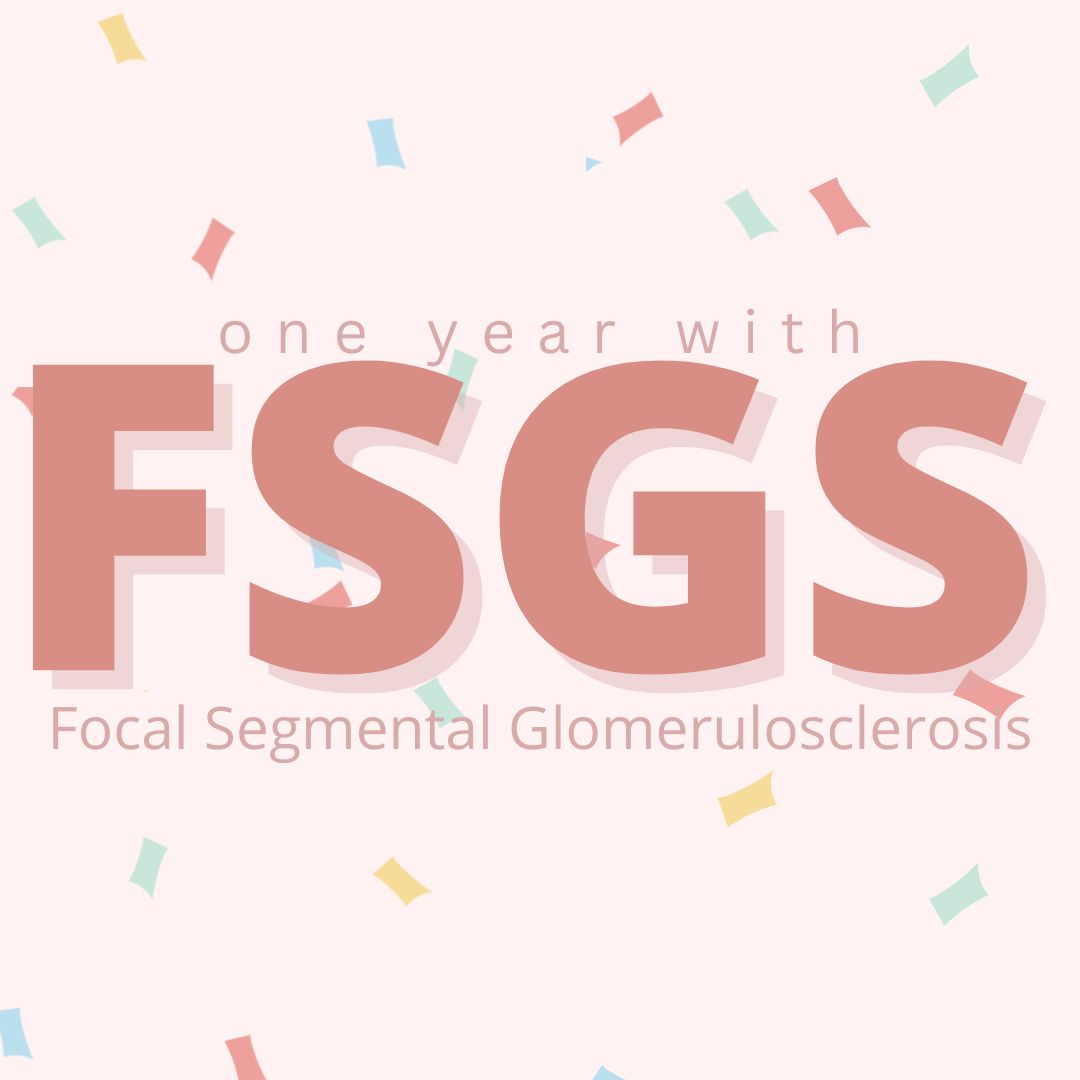FSGS for short, focal segmental glomerulosclerosis, is my red headed step child.
It is there always, caused me a TREMENDOUS amount of physical and emotional turmoil, and I have no idea why I have it or where it came from. If it weren’t for the ridiculous steroids I love to complain about, I would forget that I even have FSGS. However, without those steroids I’d quickly be brought back to reality.
Unfortunately that is how life goes when you have multiple chronic illnesses. It is kind of like whack a mole, and you just have to focus on what is in front of you at the time. I mean when you have issues with multiple vital organs, what else can you expect?
But here we are a year later after diagnosis, and I am still just as confused as I was day one. I read, research, and scour the internet for advice and answers. Yet, I’m still unsure of how to manage this disease or what causes a flare up for me.
Getting The FSGS Diagnosis
I had a ridiculous amount of swelling in my legs and abdomen leading up to diagnosis. It all started when I was pregnant (we think), and my routine urine protein tests were constantly off the charts. Looking back at historical data, I have been having low albumin (blood protein) since I had COVID in early 2020.
A few months after my daughter Renee was born I was able to have a biopsy that brought my official diagnosis of FSGS. Prior to my biopsy, I was treated for something called nephrotic syndrome. FSGS is a type of nephrotic syndrome, and the biopsy helped find the cause of my specific nephrotic syndrome.

There are a few causes for FSGS. One of them being lupus. I have never been officially diagnosed with lupus, but I sure do have a lot of secondary diagnoses that are effects of lupus. Every single diagnostic test for lupus has come back negative multiple times. Even if I did get the diagnosis by now, I’m not sure much would change.
What even is FSGS?
I’ll spare the boring physiology behind FSGS, and just leave behind a visual. Sometimes that’s all my attention can handle anyway! Long story short, FSGS is a kidney diseases that causes increased protein in the urine, low blood protein, and swelling among other factors. If you want the full story of my diagnosis you can read it here.

FSGS alone is rare and still very serious. According to NephCure, 60% of FSGS patients do not respond to treatment, and 50% of patients will result in kidney failure. In patients that do receive a kidney transplant, 30-50% of those new kidneys will again develop FSGS. That is pretty serious if you ask me. I’m so preoccupied with my heart and lung conditions, I unfortunately don’t have the head space to focus on the kidneys!
Where I Stand Now
Fortunately, my FSGS was caught early and my kidney function has been preserved thus far. At my biopsy about one year ago, it was determined my scarring was only 1%. Thankfully, that is a great starting point. I just have to figure out how to keep this disease from progressing.
The first line treatment is the devil’s drug, prednisone. Y’all have heard me complain about this medication time and again. I’ve written several posts on overcoming not only the physical, but mental side effects of prednisone. I hate to say it, but thankfully prednisone helped me significantly although I am not fully in remission.
Here is a timeline of my lab results from early onset to my most recent labs. As I mentioned, thankfully my kidney function is preserved, so those values are boring to look at. These labs below are what I can use to determine when I am in a relapse or flare. I also can see more physical signs like swelling, fatigue, and foamy urine (gross, I know).

New Medicines = New Complications
After a year on steroids, it is time to switch to a new treatment. I started a medication called tacrolimus (prograf). This is the next most effective drug for treating FSGS. What if it doesn’t work? I’m not sure, I don’t have the headspace to deal with that. I’m taking one day at a time and doing research when my mind can handle it.
I was excited to start tac because that meant I could FINALLY wean off the steroids for good! Just my luck nothing can go smoothly. About 10 minutes after ending my virtual visit with my nephrologist, he messages me not to pick up my medication or begin taking it without further instruction from my rheumatologist.
Strange and annoying, but okay. He was flagged when trying to order my prescription of tacrolimus because it could result in a serious interaction with my tried and true hydroxychloroquine (Plaquenil/HCQ – yes that one) that I take for Sjogren’s. Apparently, the two together can cause abnormal heart rhythms that can be deadly!
I’m sorry, you said what?! I’ve had my fair share of rare, so I do not mess around with “this never happens” anymore. I desperately need both medications. My rheumatologist said he has never had an interaction between the two medications before. However, we all agreed to monitor very closely with a baseline and periodic EKG until the correct dose of both medications is determined.
But Wait, There’s More…
ALSO, because that is not enough. This new medication, tacrolimus, can damage the kidneys if the dose is too high. There is no winning, ever. The good news is that lab values called troughs are taken regularly along with renal labs to closely monitor the level of medication in the blood and its interaction with the kidneys.
So everyone is finally on the same page with a plan of worst case scenarios. I go to pick up my medication from my usual pharmacy and there is an error message that my insurance won’t cover it until I call this generic number. Turns out I have to get it filled from yet another specialty pharmacy. After several phone calls and messages, that finally gets sorted out. Now 5 days later at this point, I finally have the new medicine in my possession. I am thankful for the patience of everyone who helped me reschedule my labs and EKGs one too many times, because I couldn’t start this medicine when originally planned.
This is just a small slice of what my life is like. Enjoy!
One year later, I am not quite in remission, but I am also not flaring. I’m starting a new treatment, so I can finally get off the steroids and return to my normal self again. My kidneys are still holding strong for me, and for that I am grateful.




Be the first to reply